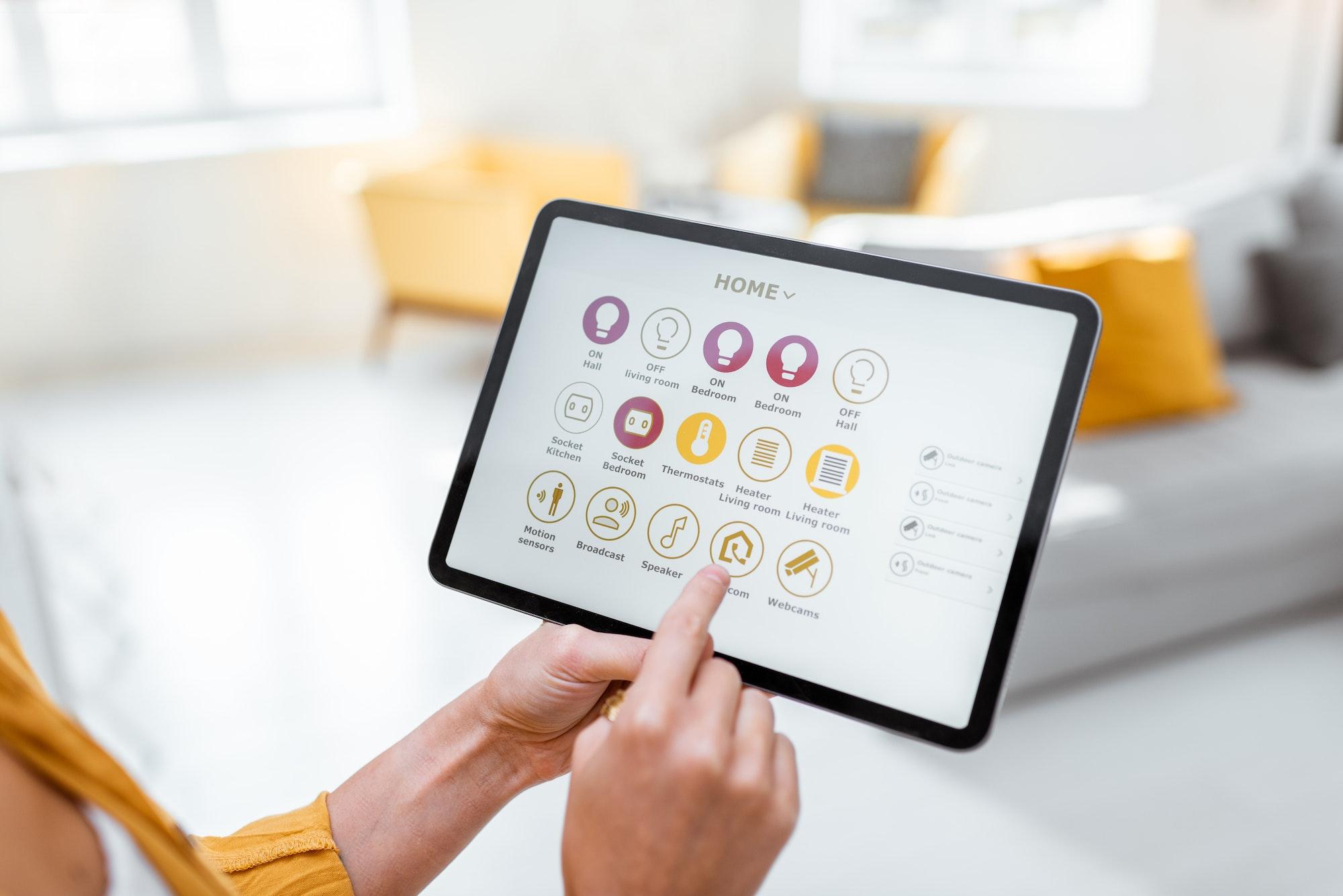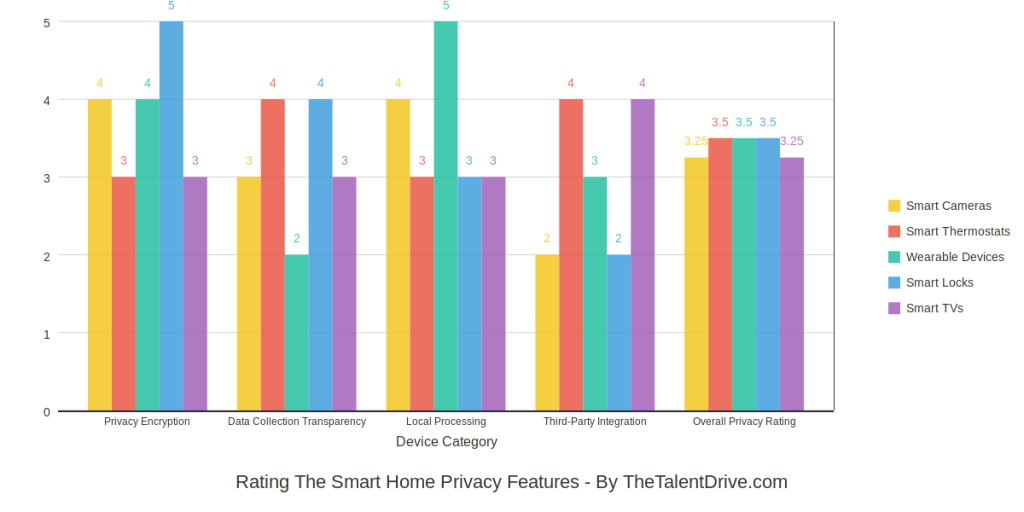
Smart Home Privacy has become a paramount concern in our rapidly advancing digital landscape. The once-futuristic idea of a “smart home” is now a tangible reality, offering convenience at our fingertips.
However, this convenience comes with a significant trade-off: the potential compromise of our smart home privacy.
In this article, we will delve into the risks that accompany a connected lifestyle and explore effective strategies to navigate these challenges while safeguarding our personal privacy.
Understanding Smart Home Privacy
Imagine a home where your refrigerator knows what groceries you need, your thermostat learns your preferred temperature settings, and your front door camera alerts you when a package is delivered.
It’s a world of convenience where devices interact to simplify your life. However, this convenience comes at a cost: your privacy.
Indeed, Your smart devices are constantly collecting data about your habits, preferences, and routines.
From the time you wake up to the moment you go to bed, your smart home is silently observing and storing information about you.
The Data Goldmine vs Smart Home Privacy: How Smart Homes Collect Information
Smart devices are designed to make your life easier, but they do so by gathering an astonishing amount of data.
Also, Your smart TV knows your viewing habits; your virtual assistant records your voice commands, and your wearable device tracks your health metrics.
This data, often referred to as the “new oil,” is a goldmine for companies aiming to understand consumer behavior and tailor their offerings.
However, this treasure trove of information also raises significant privacy concerns.
Smart Home Privacy Risks
With great convenience comes great responsibility and risk. Let’s explore some of the prominent smart home privacy risks that deserve your attention:
1. Unauthorized Data Access
Just as you lock your front door to prevent unwanted visitors, you must also secure your digital entrances.
Therefore, people with malicious intent can exploit vulnerabilities in your smart devices, gaining unauthorized access to your personal data.
From sensitive financial information to private conversations, your data could end up in the wrong hands.
2. Data Breaches and Identity Theft
The accumulation of personal data within your smart home ecosystem makes it an attractive target for cybercriminals.
A single data breach could expose not only your personal habits but also lead to identity theft, with far-reaching consequences.
3. Surveillance and Privacy Invasion
While security cameras offer a sense of protection, they also raise concerns about surveillance.
Therefore, if not properly secured, these cameras can be hacked, giving outsiders a window into your private life.
Balancing security with privacy is a tightrope walk in the smart home landscape.
4. Lack of Regulation
The rapid pace of technological advancement has outstripped regulatory frameworks.
This legal gray area means that manufacturers often prioritize functionality over security and privacy, potentially leaving your data exposed.
5. Third-Party Sharing
Smart devices often rely on third-party apps and services to operate effectively.
These partnerships can lead to the sharing of your data with external entities, further complicating the privacy landscape.
Navigating the Smart Home Privacy Maze
While the risks are real, embracing a smart home doesn’t have to mean surrendering your privacy. With a proactive approach, you can safeguard your personal information and enjoy the benefits of a connected lifestyle.
1. Strengthen Your Network Security
Begin by fortifying your home network’s defenses.
Change default passwords, keep software updated, and consider using a separate network for your smart devices to prevent potential breaches.
2. Prioritize Device Security Features
When purchasing smart devices, prioritize those with robust security features.
Look for encryption, two-factor authentication, and a track record of prompt security updates.
3. Regularly Review App Permissions
Take the time to review and manage app permissions for your smart devices.
Only grant necessary permissions and revoke access for apps that you no longer use.
4. Invest in Privacy-Focused Devices
Some manufacturers prioritize privacy by design.
Seek out devices that adhere to strong privacy standards and have a transparent data collection policy.
5. Educate Yourself
Empower yourself with knowledge about your devices. Understand what data is being collected, how it’s used, and who has access to it.
Being informed is the first step to protecting your privacy.
Comparing Smart Home Privacy Features: A Closer Look
As you navigate the landscape of smart home devices, it’s essential to make informed choices about the products you bring into your living space.
One often overlooked aspect is the range of privacy features offered by different manufacturers. So let’s delve into a comparison of privacy features across various smart home devices, shedding light on an aspect that goes beyond conventional considerations.
1. How do different devices handle data collection?
In the table below, we’ll explore how different devices handle data collection, user consent, and overall privacy protection.
| Device | Data Collection Policy | User Consent Mechanism | Privacy Control Options |
|---|---|---|---|
| Smart Speaker | Clear data usage guidelines | Voice-based permissions | Privacy mode activation |
| Smart Thermostat | Minimal data collection | In-app prompts | Temperature history deleted |
| Security Camera | Cloud storage disclosure | Geofencing notifications | End-to-end encryption |
| Wearable Device | Health data anonymization | Granular app permissions | Data export and deletion |
| Smart Lock | Access log transparency | Temporary access codes | Disable remote access |
Remember, while features can vary, understanding these aspects can empower you to make privacy-conscious decisions when integrating smart devices into your home.
2. Rating the smart home privacy features
The table below highlights several categories of smart devices and rates their privacy features on a scale of 1 to 5, with 1 being the lowest and 5 being the highest in terms of privacy protection.
| Device Category | Privacy Encryption | Data Collection Transparency | Local Processing | Third-Party Integration | Overall Privacy Rating |
|---|---|---|---|---|---|
| Smart Cameras | 4 | 3 | 4 | 2 | 3.25 |
| Smart Thermostats | 3 | 4 | 3 | 4 | 3.5 |
| Wearable Devices | 4 | 2 | 5 | 3 | 3.5 |
| Smart Locks | 5 | 4 | 3 | 2 | 3.5 |
| Smart TVs | 3 | 3 | 3 | 4 | 3.25 |
Here is a visual chart to help understand the numbers:

Please note that these ratings are based on general observations and may vary depending on specific brands and models. It’s important to conduct thorough research and read privacy policies before making a purchase decision.
3. Comparing Smart Home Privacy Across Generations
As technology advances, so do our homes. The evolution of smart home devices has brought remarkable changes, but it also raises questions about privacy across different generations. Let’s take a look at how smart home privacy concerns differ among various age groups.
| Generation | Privacy Concerns | Approach to Privacy |
|---|---|---|
| Baby Boomers | Concerned about data security and unauthorized access to personal information. | Tend to prefer manual control over devices and often avoid those perceived as intrusive. |
| Gen X | Worried about data breaches and potential identity theft. | More likely to adopt smart home devices if they see tangible benefits, but cautious about sharing personal information. |
| Millennials | Anxious about data being used for targeted advertising and surveillance. | Willing to trade some privacy for convenience but increasingly seek privacy-centric devices and settings. |
| Gen Z | Mindful of data collection but more willing to share in exchange for personalized experiences. | Embrace new technologies but tend to be more aware of privacy settings and data-sharing agreements. |
As the smart home landscape continues to evolve, understanding how different generations approach and manage privacy concerns is essential for manufacturers, policymakers, and users alike.
FAQs: Answers to Common Questions About Smart Home Privacy
1: Can smart devices listen to my conversations without my knowledge?
While smart devices like virtual assistants can record audio, they typically listen for specific wake words. However, instances of unintended activation can occur. Regularly review device privacy settings and consider muting when needed to mitigate any potential eavesdropping concerns.
2: Do smart home devices collect data?
Yes, smart home devices collect data as part of their functionality. They gather information to understand your preferences, habits, and usage patterns. This data is often used to improve device performance, offer personalized experiences, and sometimes even be shared with third-party services. It’s crucial to review the privacy policies of devices and manufacturers to understand what data is collected, how it’s used, and who has access to it.
3: What are the privacy issues with smart home devices?
Smart home devices bring convenience, but they also raise privacy concerns. These devices constantly collect data about your habits, preferences, and routines. Unauthorized data access, potential data breaches, surveillance, and a lack of regulation are among the prominent risks. This accumulation of personal information makes your smart home an attractive target for cybercriminals.
4: Are there privacy-friendly alternatives to popular smart devices?
Yes, several manufacturers prioritize privacy on their smart devices. Look for products that offer end-to-end encryption, transparent data usage policies, and minimal reliance on cloud services. These alternatives can provide functionality without compromising your smart home privacy.
5: How can I prevent data breaches from compromising my smart home privacy?
To bolster your defenses, ensure that your Wi-Fi network is secure by using strong passwords and encryption. Enable two-factor authentication for your smart devices, and regularly update their software to patch vulnerabilities. Consider segmenting your network to isolate smart devices from critical data.
6: Can I control what data my smart devices collect?
Yes, you can manage the data collection settings of your smart devices. Review app permissions and device settings to limit the information they gather. Some devices also offer options to opt out of data sharing or use advanced features without sacrificing privacy.
7: How can I stay informed about the latest smart home privacy developments?
Stay updated by following reputable tech news sources and blogs that cover privacy-related topics. Participate in online forums or communities focused on smart home technology, where users often share insights and tips for maintaining a balance between convenience and smart home privacy.
8: How do I stop smart home devices from spying on me?
To prevent smart home devices from potentially spying on you, take these steps:
- Review Permissions: Regularly review and manage app permissions for each device. Only grant essential permissions.
- Mute or Turn Off: When not in use, consider muting or turning off devices with microphones and cameras.
- Network Security: Secure your Wi-Fi network with strong passwords and encryption to prevent unauthorized access.
- Device Settings: Explore your device settings to disable any features that may compromise your privacy.
- Physical Covers: Use physical covers for cameras on devices like laptops and smart displays.
9: How can I protect my smart home data privacy?
To safeguard your smart home privacy, consider these steps:
- Strong Passwords: Set strong, unique passwords for each device and account associated with your smart home.
- Two-Factor Authentication: Enable two-factor authentication whenever possible to add an extra layer of security.
- Regular Updates: Keep devices’ firmware and software up-to-date to patch vulnerabilities.
- Network Segmentation: Create a separate network for smart devices to isolate them from sensitive data.
- Privacy-Focused Products: Choose products from manufacturers that prioritize privacy by design and are transparent about data collection practices.
Conclusion
In a world where technology infiltrates every aspect of our lives, maintaining privacy is a challenge that requires vigilance.
Smart homes offer unparalleled convenience, but this convenience should not come at the cost of your personal privacy.
By understanding the risks, making informed choices, and implementing security measures, you can strike a balance between the benefits of a connected lifestyle and the preservation of your private sphere.
As the smart home landscape continues to evolve, so must our approach to safeguarding what matters most, which is our privacy.













